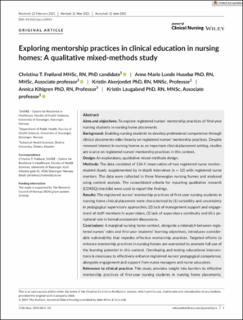| dc.contributor.author | Husebø, Anne Marie Lunde | |
| dc.contributor.author | Akerjordet, Kristin | |
| dc.contributor.author | Kihlgren, Annica | |
| dc.contributor.author | Laugaland, Kristin Alstveit | |
| dc.date.accessioned | 2021-08-25T13:59:50Z | |
| dc.date.available | 2021-08-25T13:59:50Z | |
| dc.date.created | 2021-08-23T08:28:07Z | |
| dc.date.issued | 2021-07 | |
| dc.identifier.citation | Frøiland, C.T., Husebø, A.M.L., Akerjordet, K. et al. (2021) Exploring mentorship practices in clinical education in nursing homes: A qualitative mixed-methods study. Journal of Clinical Nursing | en_US |
| dc.identifier.issn | 0962-1067 | |
| dc.identifier.uri | https://hdl.handle.net/11250/2771240 | |
| dc.description.abstract | To explore registered nurses’ mentorship practices of first-year nursing students in nursing home placements.
Background
Enabling nursing students to develop professional competence through clinical placements relies heavily on registered nurses’ mentorship practices. Despite renewed interest in nursing homes as an important clinical placement setting, studies are scarce on registered nurses’ mentorship practices in this context.
Design
An exploratory, qualitative mixed-methods design.
Methods
The data consisted of 126 h’ observation of two registered nurse mentor–student dyads, supplemented by in-depth interviews (n = 12) with registered nurse mentors. The data were collected in three Norwegian nursing homes and analysed using content analysis. The consolidated criteria for reporting qualitative research (COREQ) checklist were used to report the findings.
Results
The registered nurses’ mentorship practices of first-year nursing students in nursing home clinical placement were characterised by (1) variability and uncertainty in pedagogical supervisory approaches, (2) lack of management support and engagement of staff members in supervision, (3) lack of supervisory continuity and (4) a peripheral role in formal assessment discussions.
Conclusions
A marginal nursing home context, alongside a mismatch between registered nurses’ roles and first-year students’ learning objectives, introduces considerable vulnerability that impedes effective mentorship practices. Targeted efforts to enhance mentorship practices in nursing homes are warranted to promote full use of the learning potential in this context. Developing and testing educational interventions is necessary to effectively enhance registered nurses’ pedagogical competence, alongside engagement and support from nurse managers and nurse educators. | en_US |
| dc.language.iso | eng | en_US |
| dc.publisher | John Wiley & Sons Ltd. | en_US |
| dc.rights | Navngivelse 4.0 Internasjonal | * |
| dc.rights.uri | http://creativecommons.org/licenses/by/4.0/deed.no | * |
| dc.subject | sykehjem | en_US |
| dc.subject | mentorer | en_US |
| dc.subject | sykepleiestudenter | en_US |
| dc.title | Exploring mentorship practices in clinical education in nursing homes: A qualitative mixed-methods study | en_US |
| dc.type | Peer reviewed | en_US |
| dc.type | Journal article | en_US |
| dc.description.version | publishedVersion | en_US |
| dc.rights.holder | (C) The authors 2021 | en_US |
| dc.subject.nsi | VDP::Medisinske Fag: 700::Helsefag: 800::Sykepleievitenskap: 808 | en_US |
| dc.source.journal | Journal of Clinical Nursing (JCN) | en_US |
| dc.identifier.doi | 10.1111/jocn.15943 | |
| dc.identifier.cristin | 1927888 | |
| cristin.ispublished | true | |
| cristin.fulltext | original | |
| cristin.qualitycode | 2 | |

